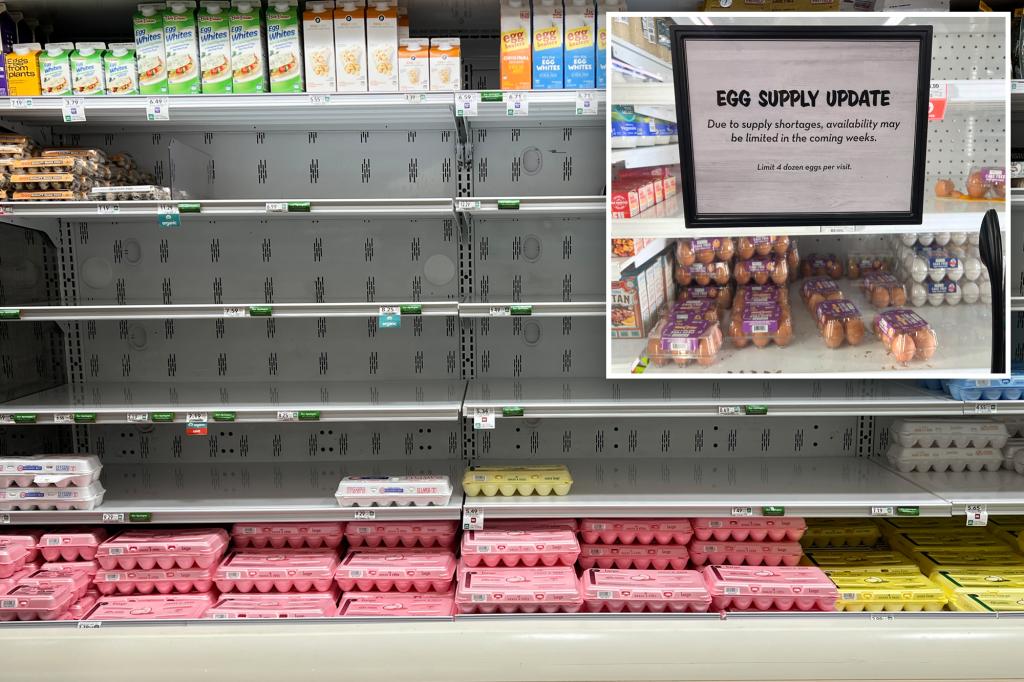Americans around the United States are heading to grocery stores and noticing that many egg shelves are nearly empty or empty, period.
“You can’t get eggs anywhere, I mean anywhere,” Fox News host Jesse Watters said on “Jesse Watters Primetime” on Wednesday evening, Jan. 22. “I can only get the bad ones that just are not yellow and aren’t fluffy.”
In New Jersey, said Watters, “you just can’t get the good, pasture-raised, nice, organic eggs.”
“So Donald Trump, before you settle the drone issue, we need eggs,” said Watters. “And we need them fast.”
Eggs are indeed in short supply and Watters’ favorite pasture-raised eggs are even harder to find.
“The national egg supply has been strained due to Highly Pathogenic Avian Influenza — also known as HPAI or bird flu — which is devastating to egg farmers,” Emily Metz, president and CEO of the Chicago-based American Egg Board, said in a statement provided to Fox News Digital.
The nonprofit organization provides resources for “national category-level egg marketing,” according to its website.
The U.S. alone lost more than 40 million laying hens to bird flu in 2024, said Metz.
While the entire country is experiencing egg shortages to some degree, Metz said it is worse in states with laws requiring that grocery store eggs be “cage-free.”
The states of Arizona, California, Colorado, Massachusetts, Michigan, Nevada, Oregon and Washington all have this legislation, according to CageFreeLaws.com, which tracks cage-free legislation by state.
“Supply disruptions may be more pronounced [among] retailers and in states that exclusively sell cage-free eggs due to impacts from HPAI on cage-free farms, which were disproportionately affected late last year,” Metz told Fox News Digital.
About 40% of laying hens in the U.S. are “cage-free,” she said.
Of birds lost to bird flu, more than half of these birds are cage-free, Metz added. “It’s important to know that bird flu does not discriminate based on farm size or housing environment. The disease is carried by wild birds,” she said.
Once a laying hen tests positive for bird flu, the entire flock is culled to prevent spread, according to the Centers for Disease Control and Prevention (CDC).
“When an egg farm is impacted with HPAI, it must go through multiple steps with government approvals before it can repopulate new flocks, a necessary process that can take six months to a year,” further adding to the supply issues, Metz said.
Egg production, she said, is “both complex and time sensitive,” she said.
“What we know right now is that our system is strained — and HPAI remains a clear and present risk to poultry flocks,” Metz said.
“The volume of eggs sold at retail has been up year-over-year for 22 consecutive months, and we’re just coming out of the highest demand season of the year — the winter holidays — when egg sales increase significantly due to holiday baking and entertaining,” Metz said.
Also impacting the U.S. egg supply is increased demand.
Despite these challenges, Metz said there is reason to be hopeful for the future.
“The good news is that egg farmers have a lot of experience working together to move eggs across the country to where they’re needed most — and that’s exactly what they’re doing now,” she said.
“Keeping their birds safe and healthy is every egg farmer’s top priority, and they are working around the clock to protect their birds, replenish supply and keep those eggs coming.”
Fox News Digital reached out to Costco for comment, where customers have noticed recent egg shortages. Many local grocery stores across the country also have seen supplies shrink and prices rise.
Read the full article here


